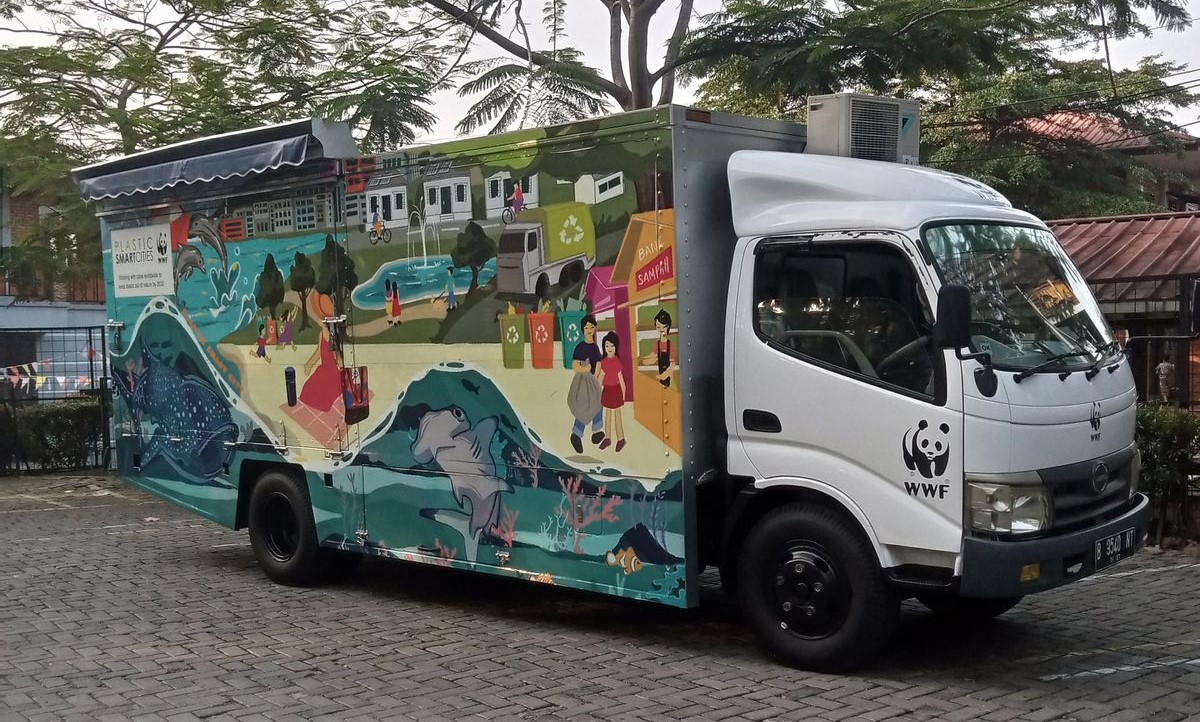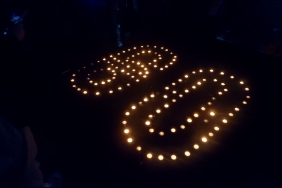LEARNING ABOUT THE POTENTIAL OF RENEWABLE ENERGY IN SANGGA BUANA URBAN FOREST WITH PANDA MOBILE
By: Sani Firmansyah
Celebrating Earth Hour 2017 which is the 10th celebration in the world, Panda Mobile WWF-Indonesia conducted environmental education with SHARP in the SHARP Greenerator Angkatan II event on Wednesday (22/03). The event, which took place at Sangga Buana Urban Forest, Karang Tengah, Pesanggrahan, South Jakarta, was opened with an inspirational story by H. Chaerudin, as the initiator and manager of Sangga Buana Urban Forest.
H. Chaerudin talked about the efforts he and the Sangga Buana team made to clean up the Pesanggrahan River in South Jakarta from piles of garbage. "Why did gue want to make Kali Pesanggrahan at first just because I was concerned, angry, annoyed, irritated, with the environmental conditions at that time. There was a lot of garbage. I thought that if the river is damaged, the forest must also be damaged. As a result, humans will be miserable.
Primayunta, Supporter Engagement Coordinator of WWF-Indonesia, said, "As Babe Idin said, if forests and rivers are damaged, the impact is not only felt by humans. Biodiversity will be disrupted so that the chain of life will run unbalanced. In addition, it turns out that from this nature we can also utilize it to be used as renewable energy."
The event continued with a walk along the Pesanggrahan River. While walking along the river, the participants were invited to pick up inorganic waste to be processed and utilized as renewable energy at the waste management site in the middle of the urban forest. On the way, the participants were invited to do "almsgiving of nature". They planted trees around the river and released fish seeds into the Pesanggrahan River. "This must be done because nature has been good to us. We should return the favor with "alms of nature". Later the benefits will come back to us," said Ario, the manager of Sangga Buana Forest.
The participants were also invited to visit a waste management site. Nearly 20 tons of waste are sent to this landfill. The managers utilize the piles of garbage for energy. The process starts with sorting the waste which is then processed so that it can produce biofuel to power the lighting of residents around Pesanggrahan River.
Furthermore, participants were divided into two groups to learn about the water conditions of Pesanggrahan River and try out renewable energy props. The group at the Water Post was invited to take samples of river water and springs available in the urban forest. One of the participants asked how to find out the characteristics of water that is suitable for consumption. "The method is very easy. What needs to be done is to see that the water must be clear, odorless and tasteless. The rest we can do further testing in the laboratory," answered Agus Haryanto, Water Specialist WWF-Indonesia. Not only looking at the water, the participants were invited to test the water quality by using a pH meter and microscope.
The second group at the Energy Post was introduced to three props that utilize solar energy, salt solution, and fresh water to be converted into electrical energy. "Sis, why can salt become electrical energy?" asked Fatimah, a SHARP Greenerator participant. "With the ionization process, electrical energy can be generated. The principle is like the battery in a car or motorcycle where there are copper and zinc plates that react due to the reaction of carbon with salt water to produce electricity with DC current," answered Saipul Siagian Frontliner Trainer WWF-Indonesia.
At the end of the activity, participants were invited to discuss and present their observations. "I do not want the information to stop here. Everyone has to continue what they learned to all their friends while transmitting the mentality of an Environmental Champion," said Babe at the end of the presentation session.
The participants of SHARP Greenerator were very impressed with the existence of Sangga Buana City Forest and the activities in it. "Who would have thought that there is still a forest in the middle of the metropolitan city of Jakarta. And here we can also generate electrical energy by utilizing waste," said Anto, a participant of SHARP Greenerator.
SHARP also hopes that this activity can have a positive impact on the environment. "The purpose of this learning for the participants of SHARP Greenerator batch II is so that they can understand various renewable energies. Hopefully, from this learning with WWF-Indonesia, all participants can support efforts to minimize the impact of climate change that is currently happening," said Mr. Sano, General Manager of SHARP Indonesia.




